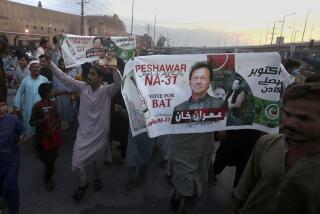Karzai Ousts Warlord From Governor’s Post
KABUL, Afghanistan — President Hamid Karzai further solidified his power Saturday by removing one of the nation’s most powerful warlords from his governor’s post and unveiled a presidential campaign platform in which he promised to rehabilitate Afghanistan’s rural economy and establish the rule of law.
Karzai chose Sept. 11 to deliver his first speech since launching his campaign earlier in the week and said he would promote a private sector, repair destroyed irrigation canals and open religious schools and maternity wards across the country.
Later in the day, Karzai announced that Ismail Khan, the governor of the western province of Herat who had resisted calls to give up his private army, would be moved to the position of minister of mines and industries.
But Khan, who has been nicknamed the “Lion of Herat” because of his resistance to the Soviet occupation of the 1980s and later the Taliban, declined to accept the new posting.
Among the nine most prominent commanders with private armies, Khan was one of the most powerful. His removal sends a message to other militia leaders who have refused to cooperate with a United Nations drive to disband their armies.
“I do not see in my capacity the position [of mining minister] as I am a military person. I do not accept,” Khan said. “I apologize to the head of government and want to stay in my home.”
Khan did, however, accept his removal from the governor’s job. He has seen his power base erode in the last year after challenges from commanders of rival factions. Last month, dozens of people were killed when his militia fought Amanullah Khan for control of an unused airport.
It appears that Karzai, criticized for having little authority outside Kabul, saw the fighting as an opportunity to consolidate his power and sent hundreds of soldiers from the new Afghan army to prevent further conflict.
American Ambassador Zalmay Khalilzad, in a statement, offered Ismail Khan his “best wishes.”
Karzai was also conciliatory, calling the decision a promotion based on Khan’s effectiveness as a governor.
“Mr. Khan’s extensive experience, gained from the effective management of provincial affairs over the years, as well as his management skills, are useful assets that must be utilized at the national level,” Karzai said in a statement.
The United States has until now supported Khan because of his tight grip and extensive intelligence network in the five western provinces. His authority there has prevented Taliban insurgents from gaining a foothold and has kept the west relatively stable.
A spokesman for the American-led forces in Afghanistan said that no violence was anticipated in the wake of the shuffle. But just hours later, Reuters reported that shots were fired after U.S. and Afghan forces were pelted with rocks by protesters who were angered by the decision to, in effect, dismiss Khan. Hospital officials, witnesses and police said two people were killed, four wounded and four arrested in the clashes.
Karzai’s announcement about Khan eclipsed his speech outlining a vision for Afghanistan after the Oct. 9 presidential election.
“I want to provide clinics and hospitals in all districts of Afghanistan and have maternity wards,” he said in a packed auditorium. “I want to improve working conditions for workers, combat poverty and help sustain rural areas for transportation, irrigation and agriculture.”
Karzai also pledged to work on improving security throughout the country. Last month, a bombing in the capital killed seven people, including three Americans, and a bombing at a school in southeastern Afghanistan killed 10.
U.S. military officials and Afghan authorities have blamed Taliban and Al Qaeda fighters for much of the violence.
Maj. Scott Nelson, a military spokesman, said a newly aired videotape by Al Qaeda’s second-in-command, Ayman Zawahiri, was a “desperate attempt” to disrupt reconstruction. He said cooperation between Afghans and U.S.-led forces was increasing.
Nick Downie, project coordinator for ANSO, a nonprofit agency that provides security advice to charities, expects more attacks across the country as the election nears.
“At this point, nothing more can be done to prevent attacks,” he said. “There should have been more military resources committed, from money to manpower to leadership. The election will go through at any cost. There will be attacks and people killed. There is not enough money invested in Afghanistan, but there is enough invested in this election.”
More to Read
Sign up for Essential California
The most important California stories and recommendations in your inbox every morning.
You may occasionally receive promotional content from the Los Angeles Times.










